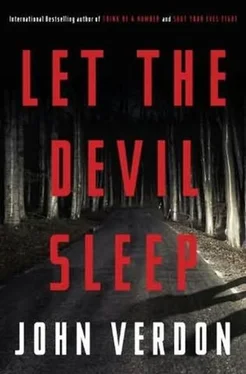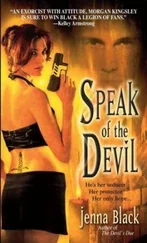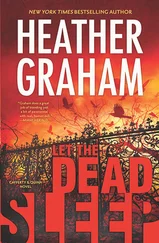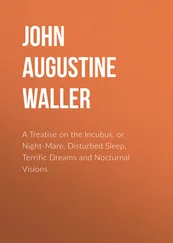
John Verdon
Let the Devil Sleep
The third book in the Dave Gurney series, 2012
Part One. The Orphans of Murder

***
She had to be stopped.
Hints had not worked. Subtle nudges had been ignored. Firmer action was called for. Something dramatic and unmistakable, accompanied by a clear explanation.
The clarity of the explanation was crucial. It could leave no room for doubt, no room for questions. The police, the media, and the naïve little meddler herself must be made to understand his message, to agree on its significance.
He stared down thoughtfully at the yellow pad in front of him and began to write:
You must abandon your ill-conceived project immediately. What you are proposing to do is intolerable. It glorifies the most destructive people on earth. It ridicules my pursuit of justice by exalting the criminals I have executed. It creates undeserved sympathy for the vilest of the vile. This cannot happen. This I will not permit. I have slept for ten years in the peace of my achievement, in the peace of my message to the world, in the peace of my justice. Force me to take up arms again and the price will be terrible .
He read what he had written. He shook his head slowly. He was not satisfied with the tone. He tore the page from the pad and slipped it into the slot of the document shredder by his chair. He began again on a fresh page:
Stop what you are doing. Stop now and walk away. Or there will be blood again, and more blood. Be warned. Do not disturb my peace .
That was better. But not quite good enough.
He’d have to work on it. Sharpen the point. Leave no doubt. Make it perfect.
And there was so little time.
Spring
The French doors were open.
From where Dave Gurney was standing by the breakfast table, he could see that the last patches of winter snow, like reluctant glaciers, had receded from the open pasture and survived now only in the more recessed and shadowed places in the surrounding woods.
The mixed fragrances of the newly exposed earth and the previous summer’s unmowed hay drifted into the big farmhouse kitchen. These were smells that once had the power to enthrall him. Now they barely touched him.
“You should step outside,” said Madeleine from where she stood at the sink, washing out her cereal bowl. “Step out into the sun. It’s quite glorious.”
“Yes, I can see that,” he said, not moving.
“Sit and have your coffee in one of the Adirondack chairs,” she said, setting the bowl down in the drying rack on the countertop. “You could use some sun.”
“Hmm.” He nodded meaninglessly and took another sip from the mug he was holding. “Is this the same coffee we’ve been using?”
“What’s wrong with it?”
“I didn’t say anything was wrong with it.”
“Yes, it’s the same coffee.”
He sighed. “I think I’m getting a cold. Last couple of days, things haven’t had much taste.”
She rested her hands on the edge of the sink island and looked at him. “You need to get out more. You need to do something.”
“Right.”
“I mean it. You can’t just sit in the house and stare at the wall all day. It will make you sick. It is making you sick. Have you called Connie Clarke back?”
“I will.”
“When?”
“When I feel like it.”
He didn’t think it was a feeling he was likely to have in the foreseeable future. That’s just the way he was these days-the way he’d been for the past six months. It was as though, after the injuries he’d suffered at the end of the bizarre Jillian Perry murder case, he had withdrawn from everything connected with normal life-daily tasks, planning, people, phone calls, commitments of any kind. He’d gotten to the point where he liked nothing better than a blank calendar page for the coming month-no appointments, no promises. He’d come to equate withdrawal with freedom.
At the same time, he had the objectivity to know that what was happening to him wasn’t good, that there was no peace in his freedom. He felt hostile, not serene.
To some extent he understood the strange entropy that was unwinding the fabric of his life and isolating him. Or at least he could list what he believed to be its causes. Near the top of the list he’d place the tinnitus he’d been experiencing since he emerged from his coma. In all likelihood it had actually begun two weeks before that, when three shots were fired at him in a small room at nearly point-blank range.
The persistent sound in his ears (which the ear, nose, and throat specialist had explained wasn’t a “sound” at all but rather a neural anomaly that the brain misinterpreted as sound) was hard to describe. The pitch was high, the volume low, the timbre like a softly hissed musical note. The phenomenon was fairly common among rock musicians and combat veterans, was anatomically mysterious, and, apart from occasional cases of spontaneous remission, was generally incurable. “Frankly, Detective Gurney,” the doctor had concluded, “considering what you’ve been through, considering the trauma and the coma, ending up with a mild ringing in your ears is a damn lucky outcome.”
It wasn’t a conclusion Dave could argue with. But it hadn’t made it any easier for him to adjust to the faint whine that enveloped him when all else was silent. It was a particular problem at night. What in daylight might resemble the harmless whistling of a teakettle in a distant room became in the darkness a sinister presence, a cold, metallic atmosphere that encased him.
Then there were the dreams-claustrophobic dreams that recalled his hospital experiences, memories of the constricting cast that had held his arm immobile, the difficulty he’d had in breathing-dreams that left him feeling panicky for long minutes after awakening.
He still had a numb spot on his right forearm close to where the first of his assailant’s bullets had shattered the wrist bone. He checked the spot regularly, sometimes hourly, in hopes that its numbness was receding-or, on bleaker days, in fear that it was spreading. There were occasional, unpredictable, stabbing pains in his side where the second bullet had passed through him. There was also an intermittent tingling-like an itch impervious to scratching-at the center of his hairline where the third bullet had fractured his skull.
Perhaps the most distressing effect of being wounded was the constant need he now felt to be armed. He’d carried a gun on the job because regulations had required it. Unlike most cops, he had no fondness for firearms. And when he left the department after twenty-five years, he left behind, along with his gold detective’s shield, the need to carry a weapon.
Until he was shot.
And now, each morning as he got dressed, the inevitable final item he put on was a small ankle holster holding a.32 Beretta. He hated the emotional need for it. Hated the change in him that required the damn thing to always be with him. He’d hoped the need would gradually diminish, but so far that wasn’t happening.
On top of everything else, it seemed to him that Madeleine had been watching him in recent weeks with a new kind of worry in her eyes-not the fleeting looks of pain and panic he’d seen in the hospital, or the alternating expressions of hopefulness and anxiety that had accompanied his early recovery, but something quieter and deeper-a half-hidden chronic dread, as if she were witnessing something terrible.
Читать дальше














